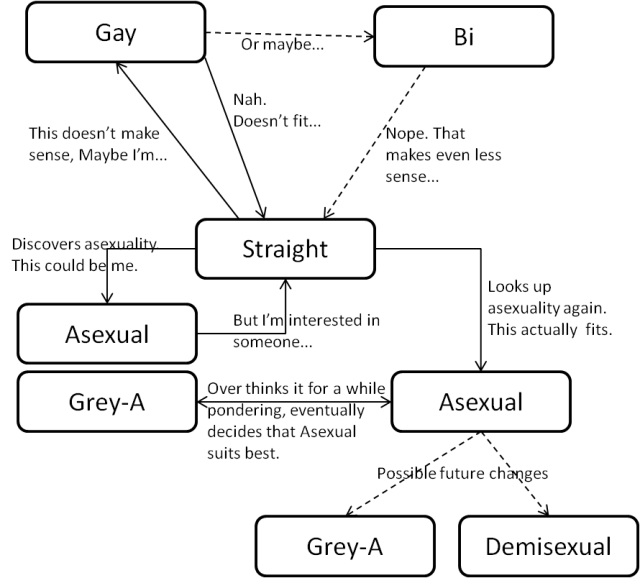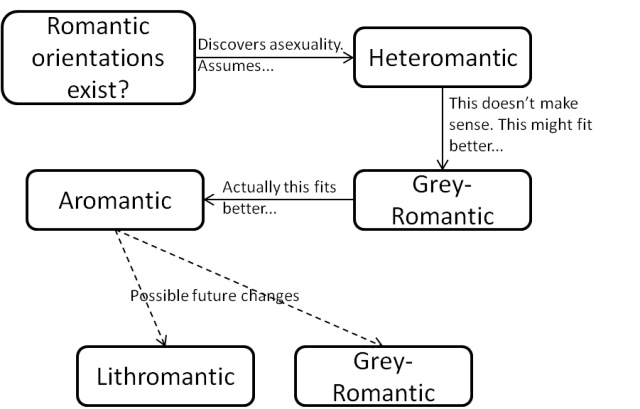This post is for the July Carnival of Aces with the topic of doubt, hosted by A Fine Line.
My identity and doubt have usually gone together though I rarely had a reason to question it myself and would usually push the doubt aside. Most of my doubt has usually been momentary and then dismissed, except when it is instigated by other people questioning my identity.
In fact the only reason I started doubting my own identity was after my mum made a comment that she would accept me regardless of my identity when I was 15. This followed me telling her about one of the girls at a school swimming carnival complaining to me that all the guys were staring at her and I didn’t even look at her (one of if not the earliest ” ace moments” that I can remember). Obviously she suspected that I might be gay.
This was something that stuck with me though and would every so often make me doubt and question whether or not I was straight (it was another 7 years before I discovered asexuality). These moments of doubt were far between usually only about once every 6 months, usually when looking at images of men that were on the TV and appreciating their aesthetics or mild sensual attraction to close friends. Most of this doubt was easily dismissed as my assumptions based on my own experiences and feelings led to overwhelming evidence that I wasn’t gay (that it was flawed due to a heteronormative mindset is beside the point). Yet despite this I kept coming back to doubting my own identity.
This eventually led towards the broken feeling that many aces have felt. For me this started as I began to build up my social confidence but was feeling that I should be in a relationship and wanting sex. Up until this point I’d been quite happy to hide behind excuses that seemed legitimate; I was still living with my parents, hadn’t gotten over my previous relationship (by this point that had been over for 2 years and was more often remembered by other people (read my mum) when I had otherwise not even thought about it). This led to me pursuing someone that was extremely different from me and at one point I remember thinking that they could “fix” me. During this time I had a group of people In the same social circle questioning my sexuality which only made me question it more and feel that I had to defend myself whilst my own doubt increased. (None of them have figured it out to my knowledge). Probably one of the biggest moments of doubt during this time occurred at a strip club which had me questioning whether I was gay again due to very mixed and confused feelings. Though by this stage I was starting to consider I might be bi, but that didn’t make sense either.
A week after I’d been to the strip club the article that I discovered asexuality in was published, which I read a week later. I remember reading it at the time and thinking “this sounds like me” but then dismissing the idea. I would be another 3-4 months before I would look at the article again, following more of the concerns over relationships and thinking I was missing something and becoming socially withdrawn. Once I started to consider it and research it further it took only took a few weeks for me to determine that I was asexual, however there was a lot of questioning and headaches involved especially when considering the grey-areas. In the end I decided that the doubt was irrelavant as it was accurate in a ball park area that was good enough for me and easy enough to explain to other people.

Map showing my thoughts about my sexual identity. Note the repetitive cycles and acceptance of the possibility I may be wrong with my current identity.
However the doubt and response to pushing that doubt aside and calling myself straight meant that it took longer to work out my romantic orientation. It was another six months after starting to consider myself asexual that I started considering myself aromantic. This process showed a notable change in the way that I was doubting my identity though. The revelation in this case came during a couple of sleepless weeks and was mostly started on a subconcious level and was progressive as I first started to look at my identity as grey-romantic before a few weeks later switching to aromantic. This process was greatly aided by having the language to actually tackle the doubt gradually as well as being able to draw on others experiences.

Map of my romantic identity. Note that due to having gone through this process with my sexuality this time it is far more linear but still acknowledges it may be wrong.
I’ve now been identifying as asexual for almost a year and aromantic for five to six months, during this time my confidence has grown. This doesn’t mean that the doubt has gone away rather I’ve found that I now have the tools to address it and in some cases can conclude that I can’t draw a conclusion based on current experience. This has led to me settling on my identity but knowing that I can label aspects that may seem to conflict (such as aesthetic preferences) and have options that should I be wrong or a current part of my identity that doesn’t fit (such as the grey-areas, or in the case of romantic orientation possibly wtfromantic).
Since discovering asexuality I’ve found my doubt to have reduced and instead of being more often caused by the reactions and questioning of others most of it is now internal, seeking to refine my understanding of my own identity. What’s more I now have the tools with which to do it!